- Home
- Toni Morrison
Paradise Page 12
Paradise Read online
Page 12
What they saw was sometimes nothing, sometimes sad, and Deek remembered everything. Towns that looked like slave quarters, picked up and moved. Towns intoxicated with wealth. Other towns affecting sleep—squirreling away money, certificates, deeds in unpainted houses on unpaved streets.
In one of the prosperous ones he and Steward watched nineteen Negro ladies arrange themselves on the steps of the town hall. They wore summer dresses of material the lightness, the delicacy of which neither of them had ever seen. Most of the dresses were white, but two were lemon yellow and one a salmon color. They wore small, pale hats of beige, dusty rose, powdery blue: hats that called attention to the wide, sparkly eyes of the wearers. Their waists were not much bigger than their necks. Laughing and teasing, they preened for a photographer lifting his head from beneath a black cloth only to hide under it again. Following a successful pose, the ladies broke apart in small groups, bending their tiny waists with rippling laughter, walking arm in arm. One adjusted another’s brooch; one exchanged her pocketbook with another. Slender feet turned and tipped in thin leather shoes. Their skin, creamy and luminous in the afternoon sun, took away his breath. A few of the younger ones crossed the street and walked past the rail fence, close, so close, to where he and Steward sat. They were on their way to a restaurant just beyond. Deek heard musical voices, low, full of delight and secret information, and in their tow a gust of verbena. The twins did not even look at each other. Without a word they agreed to fall off the railing. While they wrestled on the ground, ruining their pants and shirts, the Negro ladies turned around to see. Deek and Steward got the smiles they wanted before Big Daddy interrupted his conversation and stepped off the porch to pick each son up by his pants waist, haul them both onto the porch and crack butt with his walking stick.
Even now the verbena scent was clear; even now the summer dresses, the creamy, sunlit skin excited him. If he and Steward had not thrown themselves off the railing they would have burst into tears. So, among the vivid details of that journey—the sorrow, the stubbornness, the cunning, the wealth—Deek’s image of the nineteen summertime ladies was unlike the photographer’s. His remembrance was pastel colored and eternal.
The morning after the meeting at Calvary, pleased with his bird quota and fired, not tired, from no sleep, he decided to check out the Oven before opening up the bank. So he turned left instead of right on Central and drove past the school on the west side, Ace’s Grocery, Fleetwood’s Furniture and Appliance and several houses on the east. When he arrived at the site he circled it. Except for a few soda cans and some paper that had escaped the trash barrel, the place was blank. No fists. No loungers. He should speak to Anna Flood who owned Ace’s store now—get her to clean up the pop cans and mess that came from purchases made at her store. That’s what Ace, her father, used to do. Swept that place like it was his own kitchen, inside, out and if you’d let him he’d sweep all across the road. Pulling back onto Central, Deek noticed Misner’s beat-up Ford parked at Anna’s. Beyond, to his left, he could hear schoolchildren group-reciting a poem he’d learned by rote too, except he had had to hear Dunbar’s lines only once to memorize them completely and forever. When he and Steward had enlisted there was a lot to learn—from how to tie an army tie to how to pack a bag. And just as they had in Haven’s schoolhouse, they had been first to understand everything, remember everything. But none of it was as good as what they learned at home, sitting on floor in a firelit room, listening to war stories; to stories of great migrations—those who made it and those who did not; to the failures and triumphs of intelligent men—their fear, their bravery, their confusion; to tales of love deep and permanent. All there in the one book they owned then. Black leather covers with gold lettering; the pages thinner than young leaves, than petals. The spine frayed into webbing at the top, the corners fingered down to skin. The strong words, strange at first, becoming familiar, gaining weight and hypnotic beauty the more they heard them, made them their own.
As Deek drove north on Central, it and the side streets seemed to him as satisfactory as ever. Quiet white and yellow houses full of industry; and in them were elegant black women at useful tasks; orderly cupboards minus surfeit or miserliness; linen laundered and ironed to perfection; good meat seasoned and ready for roasting. It was a view he would be damned if K.D. or the idleness of the young would disturb.
It was a far cry from the early days of Haven and his grandfather would have scoffed at the ease of it—buying property with dollars ready to hand instead of trading years of labor for it. He would have been embarrassed by grandsons who worked twelve hours five days a week instead of the eighteen-to-twenty-hour days Haven people once needed just to keep alive, and who could hunt quail for pleasure rather than the desperate need to meet a wife and eight children at table without shame. And his cold, rheumy eyes would have narrowed at the sight of the Oven. No longer the meeting place to report on what done or what needed; on illness, births, deaths, comings and goings. The Oven that had witnessed the baptized entering sanctified life was now reduced to watching the lazy young. Two of Sargeant’s boys, three of Poole’s, two Seawrights, two Beauchamps, a couple of DuPres children—Sut’s and Pious’ girls. Even Arnette and Pat Best’s only child used to dawdle there. All of whom ought to be somewhere chopping, canning, mending, fetching. The Oven whose every brick had heard live chords praising His name was now subject to radio music, record music—music already dead when it filtered through a black wire trailing from Anna’s store to the Oven like a snake. But his grandfather would have been pleased too. Instead of children and adults convening at night in those early days to scratch letters and figures with pebbles on scraps of shale, learning to read from those who could, there was a schoolhouse here too. Not as big as the one they’d built in Haven, but it was open eight months a year and no begging the state for money to run it. Not one cent.
And just as Big Papa foretold, if they stayed together, worked, prayed and defended together, they would never be like Downs, Lexington, Sapulpa, Gans where Colored were run out of town overnight. Nor would they be among the dead and maimed of Tulsa, Norman, Oklahoma City, not to mention victims of spontaneous whippings, murders and depopulation by arson. Except for a crack here, a chink there everything in Ruby was intact. There was no need to wonder if moving the Oven had been a mistake; whether it needed its original soil as foundation for the respect and wholesome utility that was its due. No. No, Big Papa. No, Big Daddy. We did right.
Deek reassured himself with more force than confidence, for he was increasingly uneasy about Soane. Nothing he could put his fingernail under, just a steady sense of losing ground. He shared her sadness, believed he felt the loss of sons precisely and keenly as she did, except he knew more about it than she did. He, like most of the Morgans, had seen action, which is to say live death. Watched it when it was visited on others; watched it when he visited it on others. He knew that bodies did not lie down; that most often they flew apart and that what had been shipped to them in those boxes, what they pulled off the train platform in Middleton, was a collection of parts that weighed half of what a nineteen-year-old would. Easter and Scout were in integrated units and if Soane thought about it, she might consider herself lucky to know that whatever was missing, the parts were all of black men—which was a courtesy and a rule the medics tried hard to apply for fear of adding white thighs and feet to a black head. If Soane suspected what was likely—oh, man. He regretted having slipped up over coffee and mentioned what Roger was unable to do. He did not want her even to imagine the single question he put to Roger—first with Scout then with Easter: Are all the parts black? Meaning, if not, get rid of the white pieces. Roger swore to their racial consistency and the regal coffins were a sign of Morgan gratitude and a source of balm for Soane. Still, the residue of that loss seemed to be accumulating in a way he could not control. He did not trust the medicine she took and he certainly did not trust its source. But there was nothing in her behavior he could fault. She was as beautiful as it
was possible for a good woman to be; she kept a good home and did good works everywhere. Was, in fact, more generous than he would have liked, but that was hardly a complaint. There was nothing to do about it. Soane was burdened with the loss of two sons; he was burdened with the loss of all sons. Since his twin had no children the Morgans had arrived at the end of the line. Well, yes, there were Elder’s children—a flock of them roosting everywhere except at home, some of whom visited Ruby for a week only to cut it short, so eager were they to get away from the peace they found dull, the industry they found tedious and the heat they found insulting. So it was useless even to think of them as part of the legitimate line of Morgans. He and Steward were truer heirs, proof of which was Ruby itself. Who, other than the rightful heirs, would have repeated exactly what Zechariah and Rector had done? But since part of the charge had been to multiply, it was a heavy hurt to know that K.D. was the only means by which they could. K.D., son of a sister and the army buddy they gave her to. The knot that formed in Deek’s chest whenever he thought about her was familiar. Ruby. That sweet, modest laughing girl whom he and Steward had protected all their lives. She had gotten sick on the trip; seemed to heal, but failed rapidly again. When it became clear she needed serious medical help, there was no way to provide it. They drove her to Demby, then further to Middleton. No colored people were allowed in the wards. No regular doctor would attend them. She had lost control, then consciousness by the time they got to the second hospital. She died on the waiting room bench while the nurse tried to find a doctor to examine her. When the brothers learned the nurse had been trying to reach a veterinarian, and they gathered their dead sister in their arms, their shoulders shook all the way home. Ruby was buried, without benefit of a mortuary, in a pretty spot on Steward’s ranch, and it was then that the bargain was struck. A prayer in the form of a deal, no less, with God, no less, which He seemed to honor until 1969, when Easter and Scout were shipped home. After that they understood the terms and conditions of the deal much better.
Perhaps they had made a mistake in 1970, discouraging K.D. and Fleet’s daughter. She was pregnant but, after a short stay at that Convent, if she had it, she sure didn’t have it. The uncles had been worried about the shape Fleetwood’s offspring took, and besides, there were other suitable candidates around. But K.D. was still messing around with one of the strays living out there where the entrance to hell is wide, and it was time to give him the news: every brothel don’t hang a red light in the window.
He was braking in front of the bank when he noticed a solitary figure ahead. He recognized her right away but watched her carefully because first of all she had no coat, and because second, he had not seen her out of her house in six years.
Central Avenue, three wide graded miles of tarmac, began at the Oven and ended at Sargeant’s Feed and Seed. The four side streets east of Central were named after the Gospels. When a fifth street was needed it was named St. Peter. Later on, as Ruby grew, streets were laid on the west side of Central, and although these newer streets were continuations of those on the east—situated right across from them—they acquired secondary names. So St. John Street on the east become Cross John on the west. St. Luke became Cross Luke. The sanity of this pleased most everybody, Deek especially, and there was always room for additional houses (financed, if need be, by the Morgan brothers’ bank) in the plots and acres behind and beyond those already built. The woman Deek was watching seemed to be leaving Cross Peter Street and heading toward Sargeant’s Feed and Seed. But she did not stop there. Instead she was moving resolutely north, where Deek knew there was nothing for seventeen miles. What could the sweetest girl, named for her nature, be doing coatless on a chilly October morning that far from the home she had not stepped out of since 1967?
A movement in his rearview mirror took his attention, and he recognized the small red truck coming in from south country. Its driver would be Aaron Poole, late, as Deek knew he would be, since he was bringing in the final payment on his loan. After considering letting Poole wait and driving on to catch up with Sweetie, Deek cut off his motor. July, his clerk and secretary, was not due until ten. There should be no occasion when the bank of a good and serious town did not open on time.
Anna Flood said, “See. Just look at him.”
She was watching Deek’s sedan circle the Oven and then cruise slowly past her store. “Why does he have to hover like that?”
Richard Misner looked up from the woodstove. “He’s just checking on things,” he said, and went back to laying the fire. “Got a right, doesn’t he? It’s sort of his town, wouldn’t you say? His and Steward’s?”
“I would not. They may act like they own it, but they don’t.”
Misner liked a tight fire, and the one he was preparing would be just that. “Well, they founded it, didn’t they?”
“Who’ve you been talking to?” Anna left the window and walked to the back stairs, leading to her apartment. There she slid a pan of meat leavings and cereal under the stairwell. The cat, turned vicious by motherhood, stared at her with warning eyes. “Fifteen families founded this town. Fifteen, not two. One was my father, another my uncle—”
“You know what I mean,” Misner interrupted her.
Anna peeped into the darkness trying to see inside the box where the litter lay. “I do not.”
“The money,” said Misner. “The Morgans had the money. I guess I should say they financed the town—not founded it.”
The cat would not eat while being watched, so Anna forfeited a peep at the kittens and turned back to Richard Misner. “You wrong there too. Everybody pitched in. The bank idea was just a way of doing it. Families bought shares in it, you know, instead of just making deposits they could run through any old time. This way their money was safe.”
Misner nodded and wiped his hands. He didn’t want another argument. Anna refused to understand the difference between investing and cooperating. Just as she refused to believe the woodstove gave more warmth than her little electric heater.
“The Morgans had the resources, that’s all,” she said. “From their father’s bank back in Haven. My grandfather, Able Flood, was his partner. Everybody called him Big Daddy, but his real name was—”
“I know, I know. Rector. Rector Morgan, also known as Big Daddy. Son of Zechariah Morgan, known throughout Christendom as Big Papa.” And then he quoted a refrain the citizens of Ruby loved to recite. “‘Rector’s bank failed, but he didn’t.’”
“It’s true. The bank had to close down—in the early forties—but it didn’t close out. I mean they had enough so we could start over. I know what you’re thinking, but you can’t honestly say it didn’t work. People prosper here. Everybody.”
“Everybody’s prospering on credit, Anna. That’s not the same thing.”
“So?”
“So what if the credit’s gone?”
“It can’t be gone. We own the bank; the bank doesn’t own us.”
“Aw, Anna. You don’t get it, do you? You don’t understand.”
She enjoyed his face even when he was putting down people she liked. Steward, for example, he seemed to despise, but it was Steward who had taught her the scorpion lesson. When Anna was four, she was sitting on the new porch of her father’s store—back in 1954—when everybody was building something while a group of men including Steward were helping Ace Flood finish the shelving. They were inside, resting after a quick lunch, while Anna derailed ants on the steps: introducing obstacles into their routes, watching them climb over the leaf’s edge and go on as though a brand-new green mountain were an inevitable part of their journey. Suddenly a scorpion shot out near her bare foot, and she ran wide-eyed into the store. The talk stopped while the men weighed this infantile interruption, and it was Steward who picked her up in his arms, asked, What’s bothering you, good-lookin’? and relieved her fears. Anna clung to him while he explained that the scorpion’s tail was up because it was just as scared of her as she was of it. In Detroit, watching baby-faced police
handling guns, she remembered the scorpion’s rigid tail. Once, she had asked Steward what it felt like to be a twin. “Can’t say,” he answered, “since I was never not one. But I guess it feels more complete.”
“Like you can never be lonely?” Anna asked.
“Well, yes. Like that. But more like…superior.”
When Ace died she came back to Ruby and was about to sell out—the store, the apartment, the car, everything—and return to Detroit, when he came riding into town, alone, in a beat-up Ford. Calvary’s new minister.
Anna folded her arms on the wooden counter. “I own this store. My daddy died—it’s mine. No rent. No mortgage. Just taxes, town fees. I buy things; I sell things; the markup is mine.”
“You’re lucky. What about the farms? Suppose a crop fails, say, two years in a row. Does old Mrs. Sands or Nathan DuPres get to take out their share? Borrow on it? Sell it to the bank? What?”
“I don’t know what they do, but I do know it’s no gain to the bank for them to lose it. So they’d give them money to buy more seed, guano, whatever.”
“You mean lend them the money.”
“You’re making my head ache. Where you come from, all that might be true. Ruby’s different.”
“Hope so.”
“Is so. Any problem brewing sure ain’t money.”
“Well, what is it then?”
“Hard to figure, but I don’t like the way Deek’s face looks when he’s checking the Oven. He does it every day God sends now. More like hunting than checking. They’re just kids.”
“That fist painting scared a lot of people.”
“Why? It was a picture! You’d think somebody had burned a cross!” Annoyed, she started wiping things—jars, case fronts, the soda pop cooler. “He should talk to the parents, not go hunting for the kids like he’s a sheriff. Kids need more than what’s here.”

 Paradise
Paradise Beloved
Beloved Home
Home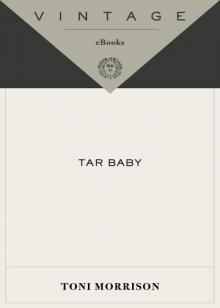 Tar Baby
Tar Baby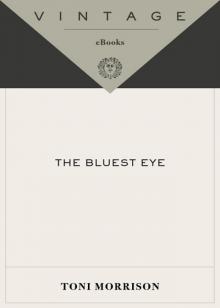 The Bluest Eye
The Bluest Eye Jazz
Jazz Love
Love Sula
Sula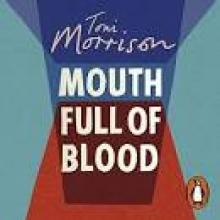 Mouth Full of Blood
Mouth Full of Blood Song of Solomon
Song of Solomon The Source of Self-Regard
The Source of Self-Regard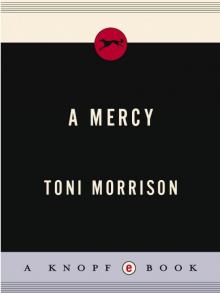 A Mercy
A Mercy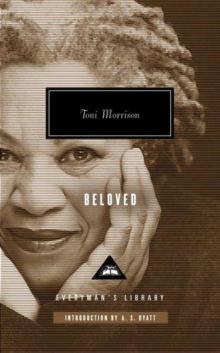 Beloved_a novel
Beloved_a novel